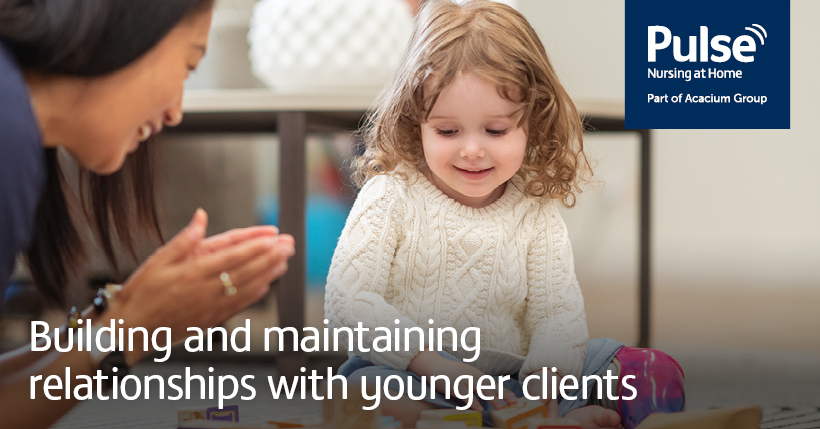 At Pulse Nursing at Home, relationship building is the foundation of the care we provide. Every client we care for is so important to us and we are responsible for providing them with high-quality care and a meaningful quality of life.
At Pulse Nursing at Home, relationship building is the foundation of the care we provide. Every client we care for is so important to us and we are responsible for providing them with high-quality care and a meaningful quality of life.
In our latest blog, Nurse Manager, Nikki shares her own experience working as a children’s nurse and her top tips for building and maintaining strong relationships with clients and their families.
From my own experiences working in healthcare, I understand how much of a unique challenge it can be when it comes to prioritising a child’s care needs as well as their family’s needs.
As healthcare professionals, building strong and trusting relationships with children and their families can be the difference between a successful and unsuccessful delivery of care.
Family-centred care is a common phrase we use at Pulse Nursing at Home to explain how we care for young clients. It focuses on both the child and their family holistically. It also acknowledges the importance of the dynamic relationship between all three parties involved - the family, the child and the healthcare professionals.
It’s vital to build strong, trusting relationships with both the child and their family. After all, children always value their parent's presence and support when it comes to their healthcare needs. When going into a new package of care, it’s important to consider involving the parents to make the child feel much more settled and less frightened.
Here are the top tips to consider when building and maintaining relationships with young clients.
1. Communication
A vital factor to always prioritise is effective communication. Communication is the most important component to building relationships with children and their families. It’s all about developing mutual trust and respect between everyone in the client’s home.
Observing how parents communicate with their children allows you to pick up on key behaviours and reactions whilst learning the child’s likes, dislikes and communication needs. It's important to remember each child is different and their age can also impact how they behave.
Additionally, it’s important to consider any sensory impairments which may impact communication. When considering these things, the child will be much more aware and feel comfortable with what's going on and they will have a better understanding of their care.
2. Utilising handovers, care plans and pen pictures
At Pulse Nursing at Home, we use handovers, care plans and ‘pen pictures’ to support our workers to learn more about the child and their preferred way of communication. Our care plans are individualised to the child's needs. Each child has their own dedicated clinical lead who manages their care plan and clinical requirements.
It’s important when building professional relationships to focus on the individual child and their family. Try to avoid comparing clients and using only the same methods you have tried on previous clients. Every child and family are different. Their personalities, preferences, needs, cultures and traditions will all differ.
3. Remember to personalise the care to the client
Care should be individualised to support the requirements of the client and their family. This provides you with a great opportunity to expand your knowledge and skills. Each client you care for provides opportunities for professional growth.
Spending time with the family and child to deliver individualised care will support building that trust, and growing a professional, personal and healthy relationship with everyone.
The Nursing and Midwifery Council have created a useful video about person-centred care and why it’s so important.
4. Ask questions
We always encourage all our workers to speak with their clinical leads for more information about their packages. This allows them to build strong relationships with the client and family. If you would like to learn more about our clinical leads and what a typical working day looks like for them, then head over to our 'A day in the life of a paediatric clinical lead' blog.
When meeting children and families for the first time, you want to start by developing a strong relationship and work with them to understand and negotiate each other’s roles. For example, a parent may want to continue delivery of personal care (e.g. nappy changes) for their child, but unless an open conversation is had with the parents and/or child, we will not necessarily understand this. Every role in care delivery is important and often a discussion that doesn’t happen between the healthcare professionals and families.
Consider starting a conversation with families and children to understand what their expectations of you are and your expectations for the parents. This provides an opportunity for you both to understand each other's point of view and ensure you're on the same page with the end goal of working together to provide the child with the very best care.
5. Be creative
Finally, children learn and develop relationships through play and interaction. Try to be interactive and use ‘play times’ in your work to significantly strengthen the relationship between you, the child and their family. The use of play is a great tool to use when delivering care, especially if the child is uncomfortable and frightened. Just like the fantastic Roald Dahl said, “A little nonsense now and then is cherished by the wisest men.'
If you are a nurse or support worker looking to work with us, please contact us on: 0207 959 1003 or register with us here.